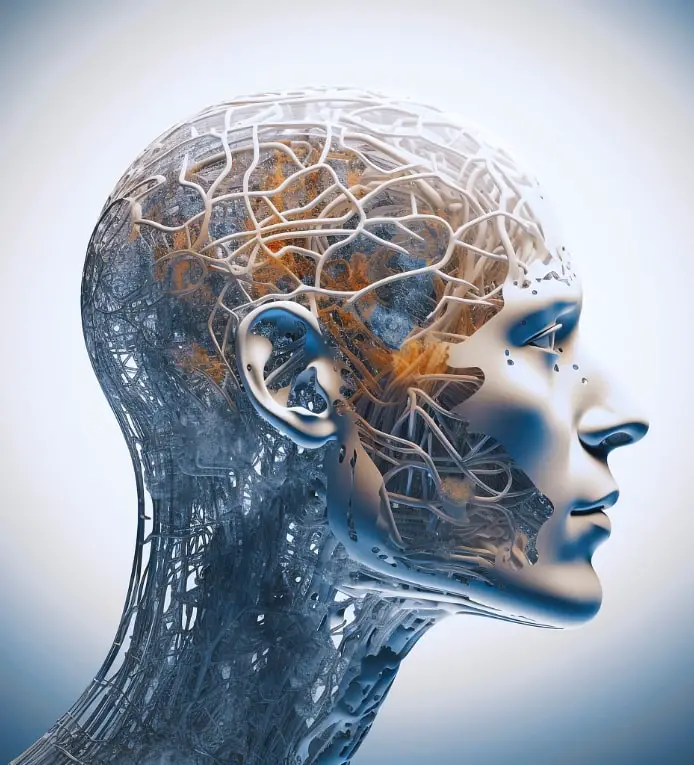The Mind-Body Connection: 7 Proven Ways to Boost Your Well-Being
Are you aware that the body screams what the mind hides?
I have to confess that on many occasions, my body has sent me clear and strong signals that I haven’t known how to interpret.
However, those ignored signals have led to more serious health problems in recent years.
So, I rolled up my sleeves and dedicated myself to researching the undeniable connection between the mind and body and how this relationship influences our physical and emotional well-being.
For starters, the mind-body connection is a term used to describe the interaction between our thoughts, emotions, and physical health.
It is now widely accepted that our mental and emotional state can significantly impact our physical health and vice versa.
Picture this – a symphony of mind and body, dancing in unison to create a life of serenity and fulfillment. The mind-body connection, often overlooked in our fast-paced lives, is vital to unlocking emotional wellness and vitality.
For us women, the mind-body connection is even more crucial. We are more likely than men to experience a range of mental health conditions, including anxiety, depression, and eating disorders.
This post will explore the most effective ways to enhance the mind-body connection.

Understanding the Mind-Body Connection
The concept of the mind-body connection suggests that mental and emotional well-being significantly influences physical health, and the reverse is also true.
Extensive studies have revealed the complex interdependence between our emotions, thoughts, and physiological processes.
“According to the mind–body or biopsychosocial paradigm, which supersedes the older biomedical model, there is no real division between mind and body because of networks of communication that exist between the brain and neurological, endocrine, and immune systems.” — Oakley Ray, Professor Emeritus of Psychology, Psychiatry and Pharmacology at Vanderbilt University.
Did you know that there is scientific evidence linking the mind and body?
The placebo effect is a phenomenon where people receiving an inactive treatment experience a beneficial effect, suggesting that the mind can play a role in healing the body.
On the other hand, the nocebo effect shows that the mind can also cause illness.
Chronic pain can be caused by stress, anxiety, and depression, indicating that the mind can impact the experience of pain.
Research has also shown that stress, anxiety, and depression can increase the risk of heart disease and even play a role in cancer development.
“Depression and depressive symptoms are not just in the brain. Your brain is connected to every other part of your body. We know more and more that these connections between the brain and the rest of the body go both ways. So things that happen in your body can affect how you think and feel. And changes in your brain can affect many different parts of your body, including your heart.” — Dr. Christopher Celano, associate director of the Cardiac Psychiatry Research Program at Massachusetts General Hospital
Though the mind-body connection is complex and still not fully understood, these examples prove that the mind can significantly impact the body positively and negatively.

Nurturing Emotional Well-Being through the Mind-Body Connection
There are many things that women can do to improve their emotional well-being and overall health through practices that enhance the mind-body connection.
1. Practice mindfulness
Incorporating mindfulness into your daily routine is essential for improving your physical health and emotional well-being.
Mindfulness strengthens the connection between your mind and body, enhancing body awareness, better emotional regulation, reducing stress levels, improving focus and concentration, and increasing body-mind integration.
Engage in regular mindfulness meditation to cultivate present-moment awareness and non-judgmental observation of thoughts, emotions, and bodily sensations.
2. Get regular exercise
Physical activity promotes body awareness, enabling individuals to become more in tune with their movements, sensations, and physical abilities.
Regular exercise makes your brain and body more connected, so you can better understand and respond to your body’s needs.
Integrating mind-body practices such as yoga or Tai Chi into your daily routine is beneficial.
These practices involve movement, breath control, and mindfulness, which can enhance physical flexibility, balance, and mental clarity. Ultimately, these practices facilitate a more profound mind-body connection.

3. Eat a healthy diet
You must keep a good diet to keep your mind and body in sync. Nutritious eating can positively impact your mood, energy levels, and well-being.
Also, a healthy diet benefits your brain health by providing essential nutrients, regulating blood sugar levels, and reducing inflammation. You can significantly improve your physical and mental health by making minor diet adjustments.
4. Learn to manage stress
Stress can affect your body and mind, but you can feel better by managing it. Yoga and tai chi can help us relax and reduce tension.
Activities like meditation and art can also help. Being mindful can help control our thoughts and emotions. By managing stress, we can improve our health and feel more balanced.
5. Connect with nature
Connecting with nature is a powerful way to rejuvenate our spirits and nurture a deeper mind-body connection.
By immersing yourself in natural environments, engaging in physical movement, and allowing yourself to be present in the beauty of nature, you can tap into its inherent wisdom and experience a profound transformation within yourself.
Nature provides sanctuary for quiet contemplation, promotes a sense of awe and wonder, and enhances our overall sense of harmony and vitality.

6. Breathwork
Explore various breathwork techniques, such as deep diaphragmatic breathing or alternate nostril breathing.
Conscious breathing can help regulate the nervous system, reduce stress, and promote a sense of calm, facilitating a stronger mind-body connection.
7. Self-Reflection and Journaling
Taking the time to reflect and journal can be beneficial in exploring one’s thoughts, emotions, and experiences. Journaling and self-reflection can enhance self-awareness and strengthen the connection between the mind and body.

These are just a few ways to boost your mind-body connection. You can foster awareness and achieve holistic well-being by constantly cultivating these practices.
Here are some additional tips for boosting your well-being:
- Get enough sleep
- Connect with others
- Avoid alcohol and drugs
- Seek support when needed
- Practice self-care
- Set realistic goals
- Learn to say no
- Take breaks when you need them
- Reward yourself for your accomplishments
- Forgive yourself and others
- Live in the present moment
- Be kind to yourself
Mind-Body exercises to enhance your well-being
Incorporating mind-body exercises into your daily routine can significantly benefit your physical, mental, and emotional well-being.
These exercises involve movement, mindfulness, and breath, creating a holistic approach to enhance our sense of fitness and deepen our connection between mind and body.

Some of the mind-body exercises that can promote a greater sense of well-being are:
Yoga
This a time-honored practice that seamlessly combines physical postures (asanas), breath control (pranayama), and meditation.
Yoga enhances flexibility, balance, and strength by engaging in gentle stretches and poses. It also fosters mindfulness and self-awareness, enabling you to connect deeply with your body.
Tai Chi
Tai Chi is a practice that involves gentle and fluid movements along with deep breathing exercises. This practice can help improve coordination, posture, and mental focus. Consistent Tai Chi practice can reduce stress levels, increase body awareness, and promote overall well-being.
Pilates
Pilates is a fitness practice that emphasizes core strength, flexibility, and proper body alignment. Through precise and controlled movements targeting specific muscle groups and coordinated breathing techniques, Pilates helps enhance body awareness and posture, developing a better connection between the mind and body. It has also alleviated back pain and improved overall body tone.
Dance
Dancing is a beautiful and liberating way to exercise your mind and body. From classical ballet to modern contemporary moves or even freestyle, dancing helps you connect with your physical self, express your feelings, and uplift your spirits.
Also, dancing enhances cardiovascular health, coordination, and physical awareness while fostering self-expression and imagination.

Each exercise offers unique benefits, from increased physical strength and flexibility to improved mental focus and emotional balance.
But the recommendation is to choose the exercise that resonates with you while embracing the journey towards self-discovery and a better mind-body connection.
No doubt, you can find effective ways to boost your emotional well-being. The first step is acknowledging the connection between thoughts, feelings, and physical health.
Recognizing the mind-body connection can enhance your life and experience greater satisfaction and authenticity. This way, you can face challenges with resilience, find joy in everyday moments, and cultivate a sense of inner harmony.
References
This may not be the complete list of references from this article.
- “The power of the placebo effect”, Harvard Health Publishing, accessed Mayo 15, 2023, https://www.health.harvard.edu/mental-health/the-power-of-the-placebo-effect
- “The nocebo effect,” Medsafe, accessed Mayo 15, 2023, https://medsafe.govt.nz/profs/PUArticles/March2019/The%20nocebo%20effect.htm
- “How Does Depression Affect the Heart?”, Heart.org, accessed Mayo 15, 2023, https://www.heart.org/en/healthy-living/healthy-lifestyle/mental-health-and-wellbeing/how-does-depression-affect-the-heart#:~:text=Can%20depression%20cause%20heart%20disease,can%20lead%20to%20heart%20disease.
- Merschel Michael, “People with depression fare worse in heart health study,” Heart.org, accessed Mayo 15, 2023, https://www.heart.org/en/news/2020/11/20/people-with-depression-fare-worse-in-heart-health-study
Hello and welcome! I’m Marilyn, the heart and soul behind CL10. I celebrate the beauty, fashion, and wellness of curvy and plus-size women. My mission is to infuse every article with glamour, enchantment, and empowerment. Dive in, and let’s inspire each other!






